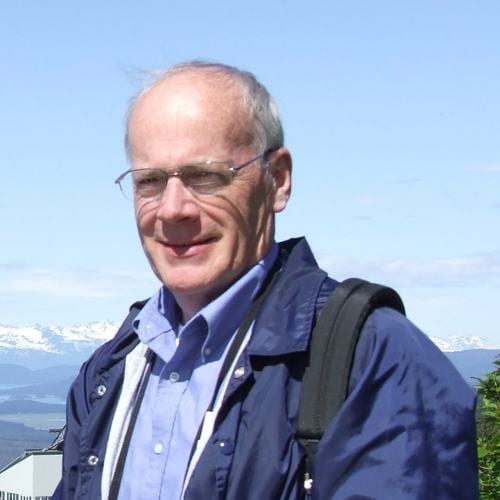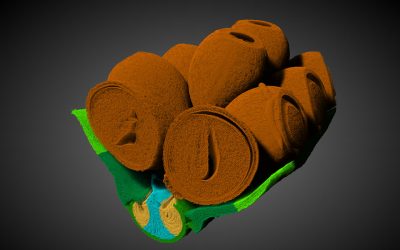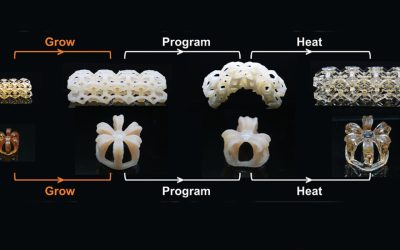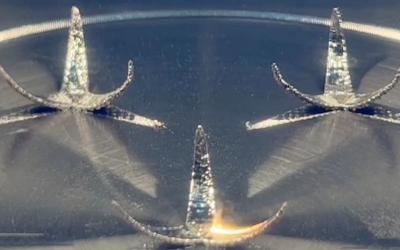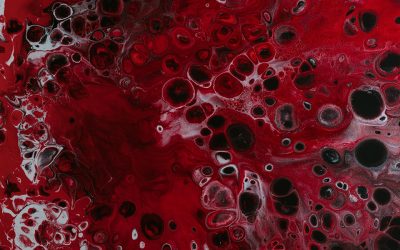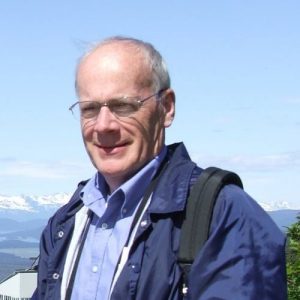 With the recent changes in United States patent laws coinciding with the publication of Francis Waller’s new guidebook on patents, MaterialsViews interviewed him to find out more about his book and the importance of intellectual property to scientists.
With the recent changes in United States patent laws coinciding with the publication of Francis Waller’s new guidebook on patents, MaterialsViews interviewed him to find out more about his book and the importance of intellectual property to scientists.
What attracted you to science and how did you get to where you are now?
My 8th grade experience of building a “cloud chamber” from common available materials for a science fair project and then winning a 2nd place award sparked my interest in science. From that point on I became persistent in my pursuit of the education necessary to understand the connection between the various disciplines of science.
Were there any strong childhood influences that lead you to this career?
Sputnik partly influenced my pursuing a science career along with high school, undergraduate, and graduate educators who had a passion for their fields.
How did you view science and scientists as a child?
To me, science was an observable discipline. You could conduct experiments and obtain answers to questions. I never met a scientist until entering college. Before that time, scientists were professionals who I read about in books, newspapers, or saw on TV.
What (or who) have been your biggest influences or motivation?
My biggest science influence occurred as a sophomore at Niagara University, NY, in my organic chemistry class. My instructor was knowledgeable, possessed outstanding intuitive reasoning skills, and was passionate about teaching organic chemistry. It was then I decided that I wanted to be an organic chemist and pursue a PhD after my B.S. with a longer term goal of either college teaching or industrial research.
What would you have done if you had not taken this career path?
This is a very interesting question. My undergraduate education gave me a great fundamental education to pursue other science careers with only a B.S. One career would have been a technician working in a chemistry laboratory.
What motivated you to choose a career in industry instead of academia?
I first tried an academic career for 3 years after my post-doc position in St. Louis, MO. In the early 1970s, jobs for chemist were limited so I taught at St. Lawrence University in Canton, NY and Simmons College in Boston, MA, replacing faculty who had gone on sabbatical leave. I then decided that a more permanent employment situation was required and I accepted an industrial position with E. I. duPont deNemours and Company in Wilmington, DE in late 1974. In hindsight, this was the best decision I made in my professional career. Industry was interested in applying scientific knowledge to find solutions to problems. Many times the solutions required discovering new knowledge. This position was challenging, motivating, and intellectually satisfying.
What got you interested in organic chemistry as a subject, and how did you develop your current interests in the intellectual property aspects of chemistry?
As mentioned previously, my interest in organic chemistry came at the undergraduate level. My post-doc experience built on my PhD with additional training in physical organic chemistry. My strength turned out to be experimentation. Designing and executing experiments gave me information to solve problems. Many times, the information was fundamental science or very novel solutions. However, working in industry usually meant filing for patents on the novel, non-obvious, and useful solutions. With no formal intellectual property education, this 30+ year industrial experience helped me to develop my interest in intellectual property.
 How does this work fit into a wider scientific / general context?
How does this work fit into a wider scientific / general context?
Intellectual property and in particular my book, “Writing Chemistry Patents and Intellectual Property- A Practical Guide” offers the newly minted chemical professional (B.S., M.S., or PhD) an introduction to intellectual property with a discussion on practical issues. The material in the book shows you how you can protect inventions for your employer and understand trade secrets and copyrights so that these topics do not get you in trouble when representing your employer or publishing for your employer. When I entered the industrial workforce, intellectual property was not a course offered at the undergraduate or graduate curriculum for a scientist. It is still not a course unless you will be an intellectual property attorney.
What influence do you believe your work will have?
This book should help to bridge the language barrier between the scientist and intellectual property attorney. It also will offer a framework for the scientist/inventor to draft a first pass patent application for their attorney to review. Hopefully the book will help the novice to avoid common pitfalls one often makes when they start out in this area.
What satisfies you most about your work?
Since 2006, the background for this book was offered through the American Chemical Society in a short course. The class participants gave much feedback to what was important to them to learn in order for them to perform their job. I believe this book reflects the everyday intellectual property issues that a scientist encounters on the job. I also hope this book can be used as a beginning text in a one semester course on writing patents.
Which of your publications are you most proud of? Which is your favorite piece of your own research?
I have been fortunate to have published about 70 scientific papers either as a single author or as a contributing author. I wish to thank DuPont and Air Products for giving me permission. The subject matter in the publications is diverse since the problems to be solved were diverse. The subject matter covered photochemistry, a nucleophilicity scale, perfluorosulfonic acid polymers ( Nafion), cellulose bleaching for paper manufacture, carbons as catalysts, Monolith Loop Reactor, conducting polymers and more. My research on perfluorosulfonic acid polymers and their modifications over my industrial career was my favorite.
What is the most exciting research paper that you have read recently?
I will not single out a specific paper but the emerging research areas of 1) biofuels and chemicals from glucose and cellulosic feedstocks and now algae and 2) relationships between genes and cancer. Both will have an impact on our future.
What are your short and long term plans?
Presently, I am working on another book not for scientists but for patent attorneys. Longer term, I hope to complete a paper on “predicting trends in rare stamp pricing”. Since I am retired, I have had some discussion about consulting on stock investments where my science background would help to make an educated stock selection. Also a concise pamphlet on Pinochle playing is on the horizon.
What are some of your professional chall
enges?
My professional challenge is finding the time in the day to accomplish my wish list of activities.
What do you see as the biggest challenges facing the scientific community?
I believe the scientific community, in general, does not do a very good job of explaining the importance of science in our daily life. I also think future research funding will be directed more toward solving societal problems. Global financial resources have become limited especially in the wake of “enthusiastic leveraged loaning and spending” which has caused unusually large worldwide debt loads from 2005 to 2010.
What do you see as the rewards and outcomes of solving such challenges?
Educating the general population about the benefits of science will help in securing the limited financial resources coming during the next several decades. Turning our attention to societal problems such as disease, medicines, food production, pure water, energy supply and use will offer scientists many opportunities to enhance our scientific base of knowledge and benefit mankind.
What is your biggest passion outside of science?
My biggest passion outside of science is training young people through the judging of local, regional, and international science fairs. Here I attempt to encourage students to excel in their passion.
What do you like to do to in your spare time?
I like to travel and explore other parts of the U.S. and foreign countries along with reading outputs from news agencies. These two activities help me to establish a high level picture of world events and what input these may have on science. I also team teach a course on playing Pinochle. Other outside activities include hiking, fishing, and growing vegetables.
What’s the coolest thing you’ve ever discovered?
One such project was working with a team of scientists involved with discovering and developing an economical, transparent and abrasive resistant coating with sufficient lifetime for plastic bus windows. Matching all these characteristics was finally solved and every time I see a bus window I think to myself that is really cool.
What do you see as the most important scientific achievement of the last 100 years?
The initiation of the human Genome Project and the follow-up direction other research has taken especially with Proteomics.
What do you think are the greatest challenges facing scientists at the moment?
The biggest challenge is finding rewarding work especially with the world economy now being more global and realizing that scientists in other parts of the world are as capable as in the U.S. But I think as scientists, we forget that scientific training is more than the discipline itself. It is also the writing, analyzing data or trends, teaching others, and experimentation skills. All of these skills can lead to work outside your immediate discipline.
Where do you see the field of materials science in 10 years time?
The high level view for materials science is the continuing effort to move more into composites, alloys, ceramics, and polymeric materials. These materials should be coupled with meaningful properties such as light absorption, biocompatability, self-healing, and conductivity to name a few.
Finally, what should scientists aspire to?
I believe future scientists should think more about interdisciplinary majors during their undergraduate training and interdisciplinary research in later years. Scientist should demonstrate high ethical behavior and work on societal needs. We should have a strong work ethic toward utilizing our reading, writing, and interpretative skills. It is our ability to learn, retain, integrate and use new knowledge that allows us to move technology forward to improve human lives. We should also think more about the global marketplace not just within our national boundaries.

